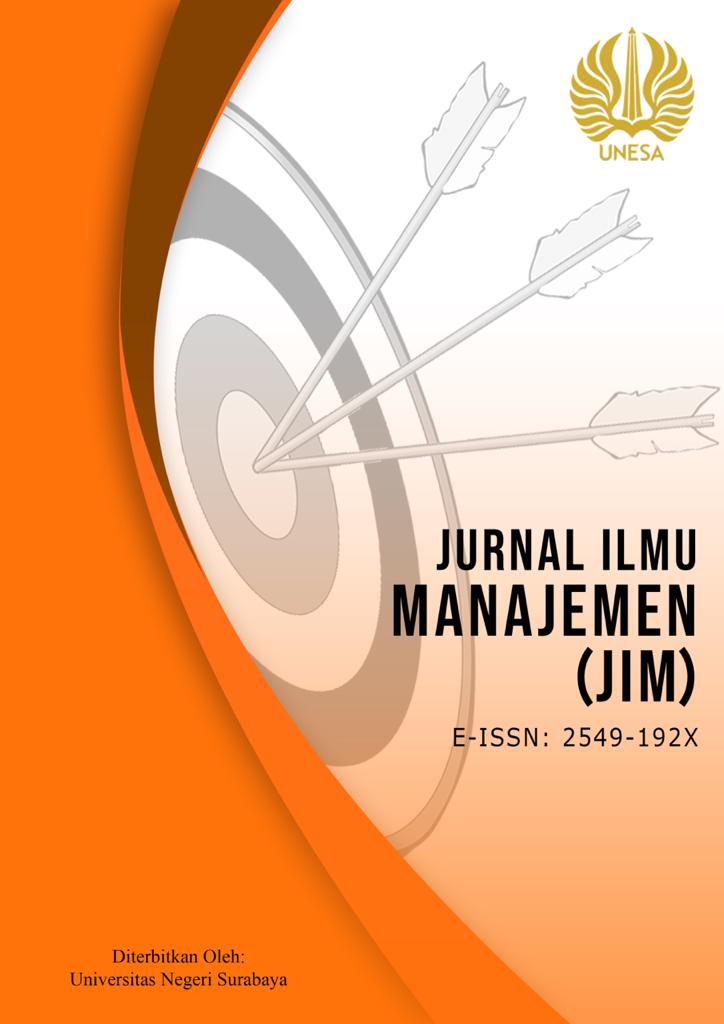Pengaruh digital leadership, management information system, artificial intelligence personal assistance, dan employees’ cyberloafing terhadap employee performance
DOI:
https://doi.org/10.26740/jim.v12n2.p437-450Keywords:
Artificial Intelligence Personal Assistance, Digital Leadership, Employee Performance, Management Information SystemAbstract
This research discusses employee performance at PT X and analyses the influence of digital leadership, management information systems, artificial intelligence personal assistance, and employees' cyberloafing. The object of this research is the employees of PT X in Surabaya, and the data collection technique used in this research is saturated samples. This study's total number of respondents was 30 people distributing questionnaires directly. This research is included in the quantitative research using data analysis techniques in the form of Structural Equation Modeling on SmartPLS version 4.0.9.6. The research results obtained are that digital leadership has a significant positive effect on employee performance, management information system has a significant positive effect on employee performance, artificial intelligence personal assistance has a significant positive impact on employee performance, and meanwhile, employees' cyberloafing has a significant negative impact on employee performance. Furthermore, the relationship between digital leadership, management information systems, artificial intelligence personal assistance, and employees' cyberloafing has a positive influence on employee performance. This research can be a reference for company leaders in improving employee performance by implementing digital leadership, management information systems, artificial intelligence personal assistance, and employees' cyberloafing for employees of PT X
References
Dwivedi, Y. K., Hughes, D. L., Coombs, C., Constantiou, I., Duan, Y., Edwards, J. S., Gupta, B., Lal, B., Misra, S., Prashant, P., Raman, R., Rana, N. P., Sharma, S. K., & Upadhyay, N. (2020). Impact of COVID-19 pandemic on information management research and practice: Transforming education, work and life. International Journal of Information Management, 55, 102211. https://doi.org/10.1016/j.ijinfomgt.2020.102211
Garson, D. G. (2016). Partial Least Squares : Regression & Structural Equation Models. Statistical Publishing Associates.
Ghozali, I. (2014). Structural Equation Modeling Metode Alternatif dengan Partial Least Squares (PLS) (4th ed.). Badan Penerbit Universitas Diponegoro.
Hasibuan, M. S. P. (2017). Manajemen Sumber Daya Manusia. Bumi Aksara.
Martini, L. A., & Darma, G. S. (2023). Menakar Peran Digital Leadership dalam Meningkatkan Kinerja Perusahaan di Era Pandemi Covid-19. Ideas: Jurnal Pendidikan, Sosial, Dan Budaya, 9(1), 115. https://doi.org/10.32884/ideas.v9i1.796
Muhidin, S. A., & Winata, H. (2016). Manajemen Kearsipan. CV. Pustaka Setia.
Pamulasari, W., & Suryana, N. (2020). Rancang Bangun Sistem Informasi Manajemen Surat Berbasis Web Pada Kantor Bpjs Ketenagakerjaan Cabang Sukabumi. ENSAINS JOURNAL, 3(1), 34. https://doi.org/10.31848/ensains.v3i1.367
Prentice, C., Wong, I. A., & Lin, Z. (CJ). (2023). Artificial intelligence as a boundary-crossing object for employee engagement and performance. Journal of Retailing and Consumer Services, 73, 103376. https://doi.org/10.1016/j.jretconser.2023.103376
Sapta, F. Y., Rahmatika, D. N., & Suliyanto, S. (2023). E-Leadership: Unveiling the Role of Digital Era Leadership in Enhancing Employee Performance in Higher Education Institution. International Journal of Current Science Research and Review, 06(07). https://doi.org/10.47191/ijcsrr/V6-i7-09
Sedarmayanti. (2015). Tata kearsipan : dengan memanfaatkan teknologi modern (R. Mandar Maju, Ed.; 5th ed.). CV. Mandar Maju.
Sugiyono. (2021). Metode Penelitian Kuantitatif Kualitatif dan R&D (Sugiyono, Ed.; 3rd ed.). Alfabeta.
Tulungen, E. E. W., Saerang, D. P. E., & Maramis, J. B. (2022). Transformasi Digital : Peran Kepemimpinan Digital. Jurnal EMBA : Jurnal Riset Ekonomi, Manajemen, Bisnis Dan Akuntansi, 10(2). https://doi.org/10.35794/emba.v10i2.41399
Yulianti, E., & Bagis, F. (2023). Effect of Workloafing, Cyberloafing and Self Efficacy on Employee Performance in Purwokerto Islamic Hospital. Journal of Economics, Social, and Humanities, 1(1). https://doi.org/10.30595/jesh.v1i1.72
Zeike, S., Bradbury, K., Lindert, L., & Pfaff, H. (2019). Digital Leadership Skills and Associations with Psychological Well-Being. International Journal of Environmental Research and Public Health, 16(14), 2628. https://doi.org/10.3390/ijerph16142628
Downloads
Published
How to Cite
Issue
Section
License

This work is licensed under a Creative Commons Attribution-NonCommercial 4.0 International License.
 Abstract views: 1078
,
Abstract views: 1078
, PDF Downloads: 661
PDF Downloads: 661











